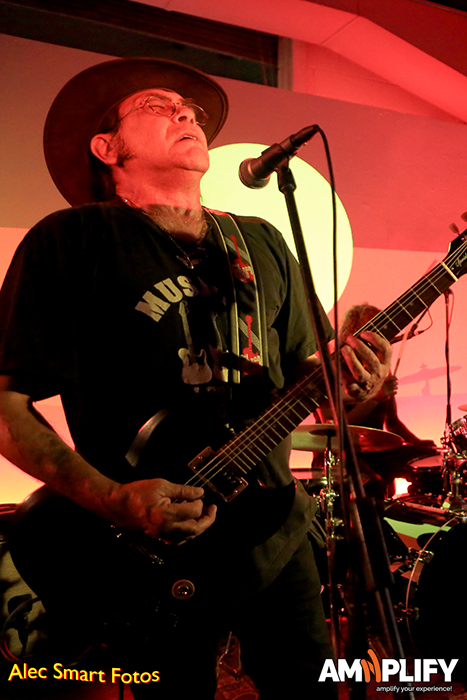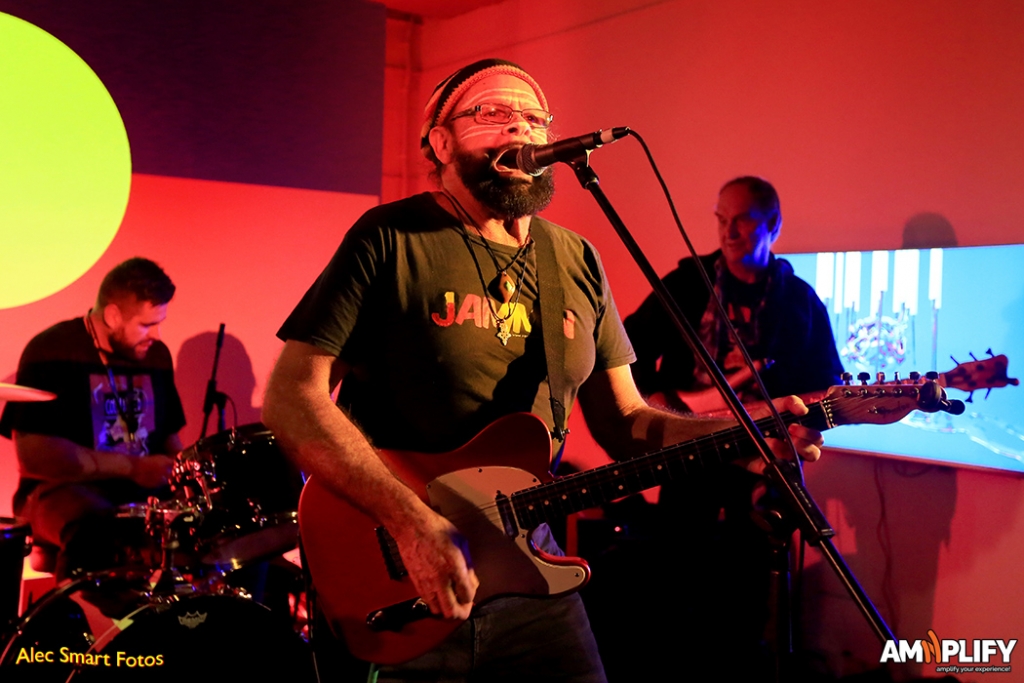Project Description
No Fixed Address + Coloured Stone @ 107 Projects 31/08/17 (Live Review)
No Fixed Address + Coloured Stone @ 107 Projects 31/08/17 (Live Review)
.
.
No Fixed Address and Coloured Stone performed at 107 Projects in Redfern, Sydney on Thursday 31 August 2017, as part of the Red Bull Music Academy Weekender (sponsored by the soft drink manufacturer). Koori Radio DJs Frank T-G and Renee provided music between bands. Gadigal elder Uncle Alan Madden gave the traditional Welcome to Country greeting.
.
107 Projects is a combined art and performance venue in central Redfern. Four screens beside the stage showcased the current installation – digital animations of trippy landscapes featuring recurring themes of meandering spaghetti-like tubes and spherical molecules flowing over cylindrical objects.
.
.
Redfern is adapting to gentrification with its accompanying café-culture and hipster youth – many of which attended the concert – while developers are building multiple high-rise apartments overhead, geared towards high-income earners.
.
This neighbourhood was once a ghetto with barred and boarded-up shops, high unemployment among the primarily Aboriginal residents, and frequent tales of corrupt police officers and brutal Tactical Response Group house raids.

No Fixed Address, 107 Projects, Redfern, Sydney, Australia. Photo: Alec Smart, 31 August 2017
.
I lived here in my late teens and remember that cops only ventured out in cars or on horseback, seldom on foot, sometimes shooting first and asking questions later – particularly when troublesome Aboriginal youth were concerned.
.
The irony is those Indigenous Australians are still here among the new bourgeoisie, along with their own cultural centres promoting Indigenous film, sports, music and other creative arts, and the audience tonight reflected that proud multi-generational community.
.
When No Fixed Address and Coloured Stone sang their songs of hardship and police harassment, the older members of the audience sang along; they remember what it was like for people of darker skin that lived around here to endure the blunt end of racism and the indifference of authorities.
.
Founded in 1977 and the longest surviving Aboriginal band in Australia, albeit with a few line-up changes, Coloured Stone are a rock-reggae fusion band that plays up-tempo songs with catchy choruses. Although a five-piece of two guitars, bass and drums, they often utilize traditional indigenous instruments, such as the didgeridoo, clap sticks and the bundawuthada (gong stone).
.

Coloured Stone, 107 Projects, Redfern, Sydney, Australia. Photo: Alec Smart, 31 August 2017
Originally centred around three brothers, Bunna, Mackie and Neil who hail from the Koonibba Mission in Ceduna, South Australia, today primary songwriter Bunna Lawrie, who for years played drums and sang, now fronts them on guitar.
.
Multi award-winning, the band were thrice nominated and once won an ARIA for best indigenous album in 1987 for their third album, Human Love, and in 1999 Lawrie became the first Aboriginal Australian to receive the coveted Don Banks Music Award, a prize usually reserved for Australian classical musicians.
.
Their debut single, Black Boy, which they played tonight inspiring an audience sing-along and rapturous applause, is one of the most recognized songs associated with contemporary Aboriginal identity in Australia. Incidentally, it also went to number one on the Fijian music charts upon its release.
.
Amidst old favourites, like Wild Desert Rose, Human Love and Dancing In The Moonlight, they performed several newer compositions from their 10th album, Dance to the Sun, released in 2013, including Distant World, and Summer Rain.
.
I first saw No Fixed Address on television in 1981, when they performed Black Man’s Rights and We Have Survived at the Royal Variety Show in Adelaide, where Prince Charles and Diana rattled their jewellery in the royal box.
.
At the time it was groundbreaking programming because the event had a reputation as being bland and conservative since its inception in Britain in 1912. For example, in 1920, popular music hall stage performer Marie Lloyd was banned at the UK Royal Variety Show because her witty songs of innuendo and double entendre were deemed offensive to the Royal Family’s sensitive ears.
.
No Fixed Address’s performance provided them a platform to the world, and the lyrics to their songs We Have Survived and Black Man’s Rights, which became unofficial Indigenous anthems – both played at 107 Projects – were broadcast into houses across the British Commonwealth.
.
“I’ve been hassled by the cops nearly all my life. We have survived the white man’s world and the hurt and the torment of it all. And you know you can’t change that,” – We Have Survived.
.
“There’s a lot of things that are trying to stop you, and that’s racism and the cops and the government which is buggered, so all you black people, you gotta fight for your rights,” – Black Man’s Rights.
.
Yet despite this platform to the world, No Fixed Address were at the time branded a ‘radical’ band and suffered regular police harassment at their shows, and were frequently denied hotel accommodation while on tour.
.
They wrote their song Pigs – performed at 107 Projects with its coda “Pigs, leave our people!” – about the harassment they endured at a young age (they formed the band while still in their teens).
.
Regardless, none other than Australian Prime Minister Bob Hawke launched No Fixed Address’s debut album, From My Eyes, at the Sydney Hilton Hotel in 1982.
.
The original line-up of the band, Ricky Harrison, Les Graham, John Miller and Bart Willoughby (sans saxophonist Veronica Rankine, who passed away in 2001) appeared together at the 107 Projects, having flown up that day from Melbourne and due to fly back to play a concert the following day.
.
As well as the three aforementioned songs, they played Time Before Me, Vision, and Get A Grip On Yourself.
.
No Fixed Address hails from the same Koonibba Aboriginal Mission in Ceduna, South Australia that spawned Coloured Stone. Drummer/vocalist Bart Willoughby and his half-brother, bassist John Miller, are cousins to Coloured Stone’s creative centre, Bunna Lawrie. Willoughby also played drums for Coloured Stone between 1985 and 1986, including their Scottish tour where they supported K.D. Lang at the 1986 Edinburgh Festival.
.
No Fixed Address coalesced as teenage music students at the Centre for Aboriginal Studies in Music (CASM) in North Adelaide, South Australia and became a popular live band, picked up as a support act by Cold Chisel and championed by Adelaide community radio station 5MMM.
.
In 1981, alongside fellow Aboriginal rock band Us Mob, they starred in the movie Wrong Side of the Road, a semi-biographical drama about discrimination and police harassment Aboriginal musicians faced trying to organise gigs and perform in Australia’s rural pubs.
.
No Fixed Address and Us Mob became the first contemporary aboriginal bands to record music and Wrong Side of the Road won several awards, both in Australia and internationally. At the 1981 Australian Film Institute Awards, it received the Jury Prize and was nominated for Best Film and Best Original Music Score.
.
In 1982 they toured Australia as main support to Jamaican reggae star Peter Tosh before a nine-date tour of England, becoming the first Aboriginal band to perform overseas.
.
The band has reformed multiple times over the years, despite going their separate ways after a decade of performing together in 1988. This includes 2009, when they played a series of concerts during a 20-year reunion tour, and on 3 June 2016 when they were inducted into the South Australian Music Hall of Fame.
.
Willoughby has enjoyed success with his solo projects as well as performing with Aboriginal bands Mixed Relations and Yothu Yindi, the latter as drummer on their 73-city tour of the USA with Midnight Oil on their 1988 Diesel & Dust Tour, and indigenous ‘super-group’ Black Arm Band, featuring key singers and musicians performing outstanding songs from Australia’s Aboriginal music history.







